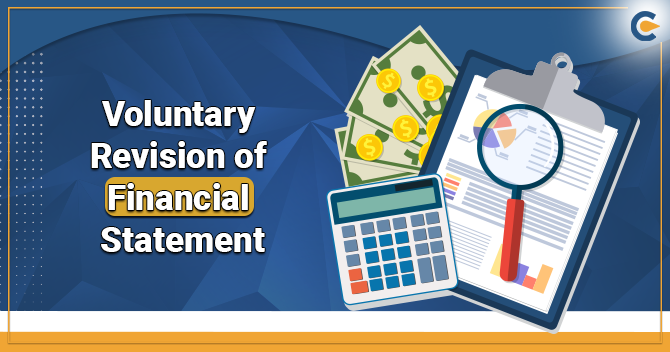Every Company irrespective of whether it’s a Private Company or Public Company has to comply annually by filing Financial Statement to ROC in form AOC-4 and MGT-7 (with necessary attachments attached) within six months of the end of the relevant Financial year.
However, section 131 of Companies Act 2013 is introduced as a savior to such incidences where the Company has filed any wrong particulars or has furnished incorrect information in its annual return. Therefore, if the Company has filed the forms and SRN is generated and got approved, it now can be revised voluntarily under the provisions of this section.
Voluntary Revision of Financial Statement or Board’s Report
As per Section 131 of Companies Act 2013[1] if it appears to the Directors of the Company at any time that the financial statement or board report doesn’t comply with the provisions of law or are prepared with some error or incorrect information that require correction can apply to Tribunal for its permission to revise the statements. The Company can file a revised statement not more than once in a financial year.
The Company, after the receipt of an order of Tribunal, can file a revised statement along with the copy of such order to ROC, provided that the Company can revise the financial statements of any of the preceding three financial years. The detailed reason for such revision shall be mentioned in the board’s report of such a relevant financial year in which revision is being filed.
Tribunal before passing any order in this regard shall give notice to Central Government or any Income Tax Authorities in case they have made a representation before Tribunal.
Read our article:What are the basic financial statements?
7 major keys for voluntary revision in India:
- It is a mandatory requirement to obtain tribunal’s approval.
- A petition for approval of revision which is filed to NCLT shall be advertised in the Newspaper
- The Tribunal on petition’s receipt shall send a notice to the Income tax authority and the Regional Department for their relevant representations
- Tribunal shall issue the notice for hearing to the original financial statements auditor.
- Any change in subscriber or directors shall be informed to the tribunal through an application
- It is only permitted to file the revised statement once in a financial year.
- It is obligatory to mention the comprehensive reason for the revision in the revised board’s report.
Steps to revise accounts voluntarily
Following are the steps that the Company has to follow for reopening or revising its financial statement:
- Send Seven days’ notice to hold and convene board meetings for passing the necessary resolution and authorization for accounts revision.
- Conduct and hold the board meeting for considering the following matters and passing the necessary resolution:
- To take the in-principal approval from NCLT for revising financial statement and board report
- To authorize a practicing professional to represent NCLT on behalf of the Company.
- Apply to NCLT in form NCLT-1 along with necessary documents such as:
- Audited financial statement of the relevant period
- MOA & AOA of the Company
- Details of personnel responsible for making and maintaining financial records such as MD, directors, Company Secretary, CFO, or any other principal officer in charge.
- Name and details of the auditor, along with the previous auditor who has at any time audited the Company’s financial statements.
- Certified True Copy of Board Resolution passed in a board meeting.
- Affidavit for verifying the petition in forms NCLT-6.
- Bank draft as proof of payment of application fee.
- Memorandum of appearance or executed vakalatnama.
- Reason for revising the financial statements and board report.
- Advertise the petition in form NCLT-3A at least 14 days before the date of hearing in English newspaper and in vernacular language in which the registered office of the Company is situated.
- The advertisement shall prescribe the following information:
- Date of presenting the application before NCLT.
- Details of the applicant along with an authorized representative.
- Grounds and reason for application.
- Statement to the effect that any person who is interested or affected in any way by such a petition or willing to oppose such an application shall send the notice of his intention to the bench and petitioner not later than two days before the hearing.
- The Company shall also advertise on its website after giving the advertisement in the newspaper.
- Affidavit in form NCLT-6 shall be filed with the Tribunal at least three days before the date of hearing as a proof stating the petition has been advertised as per the rules.
- If the rules and requirements of advertisement and service of the petition are not duly complied with by the Company, Tribunal can dismiss the petition or give any such direction as it deems fit. Tribunal can even dispense the advertisement requirement.
- Tribunal shall issue the notice to the auditor who has audited the original financial statement.Tribunal, if it deems fit can pass the necessary order in case the current auditor is different from the one who has audited the statements under review.
- After the receipt of the tribunal order, a certified copy of the order passed by Tribunal shall be filed with ROC in form INC-28 within 30 days of receipt of such orders.
- Hold and convene the general meeting to consider the revised financial statement, director’s statements, and auditor’s certificate before deciding to adopt a revised financial statement.
- Notice of such a general meeting, along with the reason for such revision, shall be advertised in English and Vernacular newspaper.
- After the approval in general meeting, the Company shall file the revised statement along with the auditor’s statement with ROC in form INC-28 within 30 days of the conclusion of such meeting.
Scope of Voluntary Revision
Section 131 specifically provides that revision shall be restricted to the correction in previous year’s financial statement or board report that doesn’t comply the provisions of companies act in case the copies of previous financial statement have been delivered to the members of the Company, to ROC or has been laid before the Company in its General Meeting.
Voluntary Revision Vs Compulsory Revision
| Basis of Difference | Compulsory revision | Voluntary revision |
| Governing provision | It is regulated under section 130 of companies act 2013 | It is governed under the provision of section 131 of companies act 2013 |
| Petition filing | The central government, Income tax authority, SEBI, and such authorities can apply for revising the statements. | The Company through its representative such as practicing professionals can apply to the Tribunal for the revision of its statement. |
| Grounds for application | An application under this section can only be made if accounts are found to be fraudulent, misleading, or incorrect. | The Company can apply if the statements are not made or prepared as per the law. |
| Permissible revision | Books can be revised of up to 8 previous financial years. | Books cannot be revised for more than three preceding years. |
Conclusion
No such provision for filing revised statement prevailed earlier under Companies Act 1956. Companies and its principal officers are relieved now with the introduction of this provision in Companies Act 2013, as they are now permitted to file a revised statement.
For any further query concerning the revised statement or assistance relating to the complete procedure from applying Tribunal to filing a revised statement, you can contact us.
Read our article:Do You Know About Income Tax For NRI In India: 10 Minutes Read











